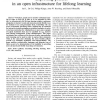Free Online Productivity Tools
i2Speak
i2Symbol
i2OCR
iTex2Img
iWeb2Print
iWeb2Shot
i2Type
iPdf2Split
iPdf2Merge
i2Bopomofo
i2Arabic
i2Style
i2Image
i2PDF
iLatex2Rtf
Sci2ools
TLT
2008
2008
Control Your eLearning Environment: Exploiting Policies in an Open Infrastructure for Lifelong Learning
Abstract-- Nowadays, people are in need for continuous learning in order to keep up to date or to be upgraded in their job. An infrastructure for life-long learning requires continuous adaptation to learners' needs and must also provide flexible ways for students to use and personalize them. Controlling who can access a document, specifying when a student may be contacted for interactive instant messaging or periodical reminders in order to increase motivation for collaboration are just some examples of typical statements that may be specified by e.g., learners and learning management system administrators. This paper investigates how existing work in the area of policy representation and reasoning can be used in order to express these statements while at the same time obtaining the extra benefits policies provide (e.g., flexibility, dynamicity and interoperability). The paper analyzes existing policy languages and integrates one of them as part of a demonstration of its feasibili...
| Added | 15 Dec 2010 |
| Updated | 15 Dec 2010 |
| Type | Journal |
| Year | 2008 |
| Where | TLT |
| Authors | Juri Luca De Coi, Philipp Kärger, Arne Wolf Koesling, Daniel Olmedilla |
Comments (0)

